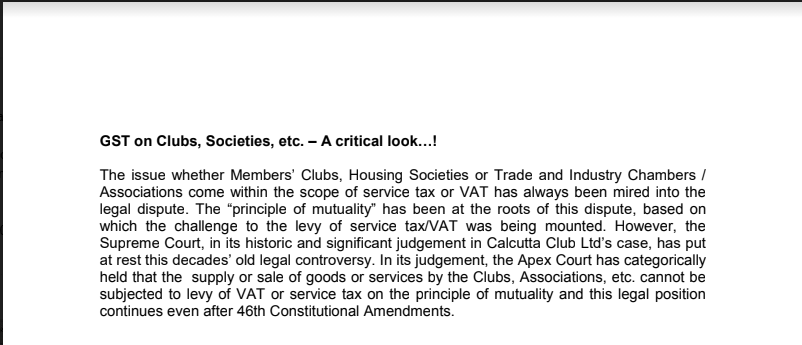GST on Clubs, Societies, etc. – A critical look…!
The issue whether Members‟ Clubs, Housing Societies or Trade and Industry Chambers / Associations come within the scope of service tax or VAT has always been mired into the legal dispute. The “principle of mutuality” has been at the roots of this dispute, based on which the challenge to the levy of service tax/VAT was being mounted. However, the Supreme Court, in its historic and significant judgement in Calcutta Club Ltd’s case, has put at rest this decades‟ old legal controversy. In its judgement, the Apex Court has categorically held that the supply or sale of goods or services by the Clubs, Associations, etc. cannot be subjected to levy of VAT or service tax on the principle of mutuality and this legal position continues even after 46th Constitutional Amendments.
While all were heaving the sigh of relief at the possible end of a legal battle on this issue in the context of VAT/service tax, there arose a possibility of a fresh legal battle with the introduction of GST on 1st July, 2017. The issue being raised is clear: “Considering the specific provisions of the CGST Act, 2017, whether the principle of mutuality would remain relevant and can it be made applicable under GST?” There have been conflicting views on this issue ever since the new tax regime has come into operation. However, more than anyone else, the GST Council was quite sensitive to this issue and didn’t want to take any chance in the matter. In its 39th Meeting held on 14th March, 2020, the Council had discussed the implications of the judgement of the Supreme Court on GST levy on Clubs, etc. at length. It was concluded at the meeting that the principle of law laid down by the Supreme Court in its judgement would equally be applicable under GST and consequently, the levy of GST on Clubs, Associations, etc. would result into the legal battle. In order to avoid any such legal conflict , the Council, at the said Meeting, had decided to carry out certain amendments to the specific provisions of the CGST Act, 2017.
Taking into account the recommendations of the Council, certain amendments have been proposed by the Finance Bill, 2021 to Section 7 and para 7 of the Schedule II of the CGST Act, 2017. It may be noted here that Section 7 contains the definition of „supply‟. It is clear that the purpose of the proposed amendment is to ensure the recovery of GST on the Members‟ Club, Societies, Associations etc. without any legal hindrance. It is, however, a matter of concern that the proposed amendments are being given retrospective effect from July 01, 2017.
Proposed amendments will come into effect from the date to be notified by the Central Government after the enactment of the Finance Bill and will be operative retrospectively. Undisputedly, the issue of retrospective effect being given to the amendments will once again become a matter of legal dispute and challenge. Moreover, on a deeper and critical examination of the proposed amendments and other relevant statutory provisions, a view can be taken that even after these amendments, Housing Societies, Associations or Chambers would remain outside the scope of the levy of GST. Proposed amendments are incomplete, half-hearted and vague and would certainly invite the legal battle. It would also be premature to say that as a consequence of the proposed amendments, Members‟ Club would come within the GST net.
In the end, even if the need and validity of the proposed amendments is accepted, it is indeed unreasonable, unfair and unjust to make the amendments effective retrospectively.
Q & A:
Q. From which date the amendments proposed by the Finance Bill, 2021 in the CGST Act, 2017 so as to bring Clubs, Societies, etc. within the GST net, will become effective ?
Ans: The amendments proposed by the Finance Bill, 2021 in the CGST Act, 2017 would amendments will come to life only on the date to be notified by the Central Government and on that date, it would take effect retrospectively from July 01, 2017.
Q. Will the Clubs, Housing Societies, etc. become liable to pay GST once the proposed amendments come into effect?
Ans: In the opinion of the author, even after the proposed amendments come into effect, the Housing Societies, Associations, etc. would remain outside the scope of the levy of GST and it is possible to take such a legal view. Even Members‟ Clubs may also have a legal and valid reason to challenge the levy of GST on them as a consequence of these amendments.
Q. Will the Housing Societies, etc. be liable to pay GST for the past period from July 01, 2017 after the proposed amendments? Will they also be liable for the penal action?
Ans: As stated earlier, it is possible to take a legal stand that even after the proposed amendments become effective, the Housing societies, etc. would remain outside the levy of GST in future and needless to say, for the past period as well effective from July 01, 2017. Moreover, the retrospective effect being given to the proposed amendments is also a subject matter of legal dispute and susceptible to the challenge in the Court of law. At the same time, even if the recovery of GST is made on the strength of these amendments retrospectively, the taxpayer cannot be imposed with the penalty when the levy is imposed through retrospective amendments. This principle of law is well settled by various judicial pronouncements.
 Advocate Shailesh Sheth
Advocate Shailesh Sheth
Qualifications: B.Com.LLB Background: Shailesh has over 30 years’ experience in Consulting, Advisory and Litigation practice in the field of Indirect Tax Laws that include Central Excise, Service Tax, Customs, State VAT Laws, CST & GST. Shailesh is also one of the Partners in a legal firm, namely, M/s. RVS LEGAL having its base in Chennai, Bangalore and Mumbai. Mr. V. Raghuraman, Advocate, Bangalore and Mr. K. Vaitheeswaran, Advocate, Chennai are two other Partners in the firm. This boutique firm specialises in Indirect Taxation, Direct Tax, International Taxation, Arbitration, Corporate Laws (including IBC), Drafting/Vetting of Commercial Contracts, amongst other fields. Representative Industry Experience: Shailesh has dealt extensively in the areas of Central Excise, Service Tax, Customs, GST and CST/VAT across the entire trade and industry spectrum consisting of Manufacturing, Service Sector and Distributive Trade representing diverse sectors Public Profile: Shailesh has been a regular faculty at various professional bodies as well as Trade and Industry Forums on his chosen field. He has already delivered more than 90 lectures since April, 2017 on various aspects of GST all over India. Shailesh is a regular columnist in ‘Vyapar’- a Bi-weekly Business Newspaper of Janmabhoomi Group – on Service Tax, Central Excise & GST and has also contributed number of articles to various magazines as well as Taxation Websites like TIOL, etc. Membership/Association with professional/trade/industry bodies: Besides professional bodies like Chamber of Tax Consultants and AIFTP, Shailesh is also associated with various trade/industry bodies including Indian Merchants’ Chamber (Indirect Tax Committee), ITAMMA, IDMA, AIRIA, BSE Brokers’ Forum, Builders Association of India (BAI), NAREDCO, Brihanmumbai Developers Association (BDA) & other bodies guiding them in the field of Indirect Tax.










